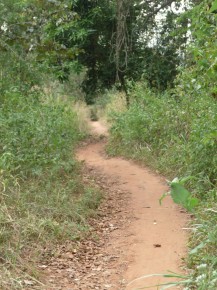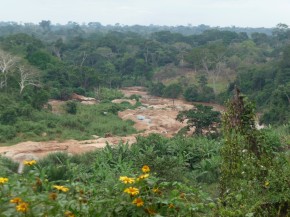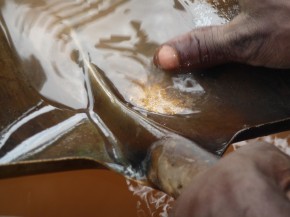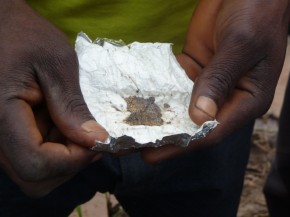
Olympic fever is running high in the UK. London 2012 kicks off in late July, and the excitement is palpable, even from an Embassy a whole continent away from home. So it's no wonder that everything we do this year – setting targets for our teams, communicating key messages – is couched in terms that relate to this momentous British occasion. Doing well on something might mean achieving a bronze standard – but outstanding performance means going for gold.

In Kinshasa, there's a degree of coverage of the Olympics in the press. But for the DRC as a whole, going for gold has a much more literal meaning – and one that might make the difference between poverty and a meaningful income. I saw this for myself on my most recent visit to a UK-funded roads project, in the southern province of Katanga.
The road that extends north and south from the town of Kalemie on the shores of Lake Tanganyika is Route Nationale 5. But you wouldn't know it. After decades of weak governance and conflict, the road had turned back into a path, passable only by bicycle or foot. Gradually, with funding from the UK and the World Bank, the road is being reopened again.
The east of DRC is one of the richest areas of the world in terms of natural resources. With forests, oil, diamonds, copper, coltan and cassiterite, to name just a few, DRC has it all.

So it was no surprise to come across an artisanal gold mine on the road from Kalemie towards Uvira in South Kivu. I’ve visited mines before, from the world’s largest copper mine in the north of Chile to the silver mines of Potosi in Bolivia to the now-closed coal mines of my birthplace in Yorkshire. But I've never seen earth so rich in precious metals that you can literally pick them up from the ground beneath your feet.
We watched as local villagers picked up a handful of soil, rinsed it on a spade, and filtered it through a tripe-like part of the banana tree that caught the lumps of gold and let the soil wash away. After less than five minutes, a sizeable pile of ore had appeared.

Now that the road has been re-opened as far as this mine, the gold can be sold on and the village will enjoy some of the fruits of its labours. But that's not the end of the story.
Of course the mining sector in DRC needs a good set of regulations. But with so much mining being artisanal and happening in isolated locations, those regulations can be very difficult to apply. That means that people might work in unsafe conditions, use child labour, or damage the environment – and that the government does not receive the tax revenues it should.

On the industrial logging side, too, it is crucial that contracts are awarded fairly and transparently, that revenues accrue to the government and is used to the benefit of the poorest in DRC, and that the proceeds of mining are not mis-used to finance conflict.
To tackle these thorny issues, the DRC is working towards joining the Extractive Industries Transparency Initiative, a coalition of governments, companies and civil society working to make sure natural resources benefit everyone and setting standards for companies to publish what they pay and for governments to disclose what they receive. The UK is providing support to the DRC to improve transparency and revenue in the mining sector. We are also working to encourage adoption of the Voluntary Principles on Security and Human Rights.
In addtion, we are supporting development in a range of sectors that impact on the mining sector – through our governance, public financial management, anti-corruption, conflict, roads, private sector development and mining programmes.

So the UK's support will help the DRC to go for gold in the long term.
In the meantime, here's hoping that the DRC can go for gold during London 2012 – and that this is the year for the very first Congolese Olympic medal.

2 comments
Comment by Willy Vangu posted on
not sure I share you optimism Vicky in this charming little post.....
http://www.youtube.com/watch?v=PsJg1GDCNmA
Comment by k lillis posted on
going for gold at london 2012? read "Running for blackgold - fifty years of african athletics" (ian randle publications, jamaica)